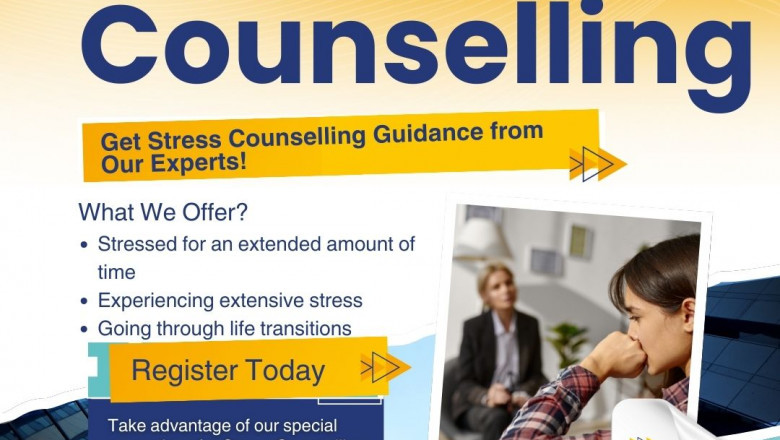views
Introduction
Life is hectic, isn’t it? Between juggling work, relationships, and personal responsibilities, stress seems inevitable in our daily routine. But here’s the thing – it doesn’t have to be. Stress counselling offers a lifeline to help you regain control and live a healthier, more peaceful life. Let’s dive into what stress counselling is all about and why it might be the best decision you’ll ever make for your well-being.
Understanding Stress
What is Stress?
Stress is your body’s natural response to challenges or demands. While a little stress can motivate you to meet deadlines or achieve goals, chronic stress can take a serious toll on your health.
Common Causes of Stress
Stress can stem from about anything, from financial troubles and work pressures to family issues and health concerns. Recognizing the cause is often the first step toward managing it effectively.
Signs and Symptoms of Stress
-
Constant worry or anxiety
-
Irritability or mood swings
-
Difficulty concentrating
-
Physical symptoms like headaches, fatigue, or sleep disturbances
What is Stress Counselling?
Definition of Stress Counselling
Stress counselling is a therapeutic approach designed to help individuals understand, manage, and overcome stress. Think of it as a safe space where you can offload your worries and learn effective coping mechanisms.
The Role of a Stress Counsellor
A stress counsellor is like a guide who helps you navigate the storm of stress. They listen without judgment, offer practical advice, and empower you with tools to handle life’s challenges.
Types of Stress Counselling
Individual Counselling
One-on-one sessions tailored to your specific needs.
Group Counselling
A supportive environment where individuals share experiences and learn from one another.
Online Counselling
Convenient and accessible, especially in today’s digital age.
How Stress Counselling Works
Initial Assessment
Your counsellor will start by understanding your stressors and how they affect you.
Developing Coping Strategies
From breathing exercises to thought reframing, you’ll learn practical techniques to reduce stress.
Long-Term Stress Management
The goal is not just immediate relief but also building resilience for the future.
Benefits of Stress Counselling
Improved Mental Health
Say goodbye to constant worry and hello to a clearer, calmer mind.
Enhanced Physical Well-being
Reduced stress often translates to better sleep, lower blood pressure, and improved immunity.
Better Relationships
Learning to manage stress can help you communicate more effectively and foster stronger connections with loved ones.
Who Can Benefit from Stress Counselling?
Students
Struggling with academic pressures? Stress counselling can help.
Working Professionals
Workplace stress is real, but you don’t have to face it alone.
Caregivers and Parents
Balancing care for others and self-care is a tough act, but counselling can make it easier.
Techniques Used in Stress Counselling
Cognitive Behavioral Therapy (CBT)
Helps you identify and challenge negative thought patterns.
Relaxation Techniques
Think deep breathing, progressive muscle relaxation, and visualization exercises.
Mindfulness and Meditation
A powerful way to stay present and reduce stress.
= How to Find the Right Stress Counsellor
Qualifications to Look For
Ensure your counsellor is licensed and experienced in stress management.
Questions to Ask Before Choosing
-
What’s their approach to stress counselling?
-
Do they offer flexible session timings?
The Role of Lifestyle Changes
Diet and Nutrition
What you eat affects how you feel. Opt for a balanced diet to combat stress.
Exercise and Physical Activity
Even a short walk can work wonders for your mood.
Sleep Hygiene
A well-rested mind is better equipped to handle stress.
Common Myths About Stress Counselling
Myth 1: Stress Counselling is Only for the Weak
Seeking help is a sign of strength, not weakness.
Myth 2: Counselling Provides Instant Solutions
It’s a process, but one that’s worth the time and effort.
When to Seek Stress Counselling
Recognizing the Right Time to Get Help
If stress is interfering with your daily life, it’s time to seek professional support.
Tips to Manage Stress Daily
Time Management
Plan your day and prioritize tasks.
Setting Realistic Goals
Avoid overwhelming yourself with unrealistic expectations.
Practicing Gratitude
Focusing on the positives can shift your perspective.
Success Stories from Stress Counselling
Real-life Examples of Overcoming Stress
From students acing exams to professionals finding work-life balance, the transformative power of stress counselling is undeniable.
Conclusion
Stress counselling isn’t just about managing stress; it’s about reclaiming your life and happiness. With the right guidance and tools, you can overcome even the most overwhelming challenges. Don’t let stress dictate your story – take charge and rewrite it.
FAQs
1. What is the Cost of Stress Counselling?
The cost varies but is often affordable, especially with online options.
2. How Long Does it Take to See Results?
You might notice changes within a few sessions, but long-term results take consistent effort.
3. Can Stress Counselling Be Done Online?
Absolutely! Online counselling is just as effective and convenient.
4. Is Stress Counselling Confidential?
Yes, counsellors are bound by strict confidentiality agreements.
5. Can Stress Counselling Prevent Burnout?
Yes, by teaching you how to manage stress effectively, counselling can reduce the risk of burnout.






















Comments
0 comment